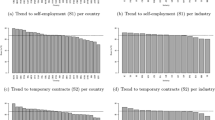Abstract
While foreign-owned firms have consistently been found to pay higher wages than domestic firms to what appear to be equally productive workers, the causes of this remain unresolved. In a two-period bargaining framework we show that if training is more productive and specific in foreign firms, foreign firm workers will have a steeper wage profile and thus acquire a premium over time. Using a rich employer-employee matched data set we verify that the foreign wage premium is only acquired by workers over time spent in the firm and only by those that receive on-the-job training, thus providing empirical support for a firm-specific human capital acquisition explanation.
Similar content being viewed by others
References
Acemoglu, D., and J. Pischke (1999). The Structure of Wages and Investment in General Training. Journal of Political Economy 107 (3): 539–572.
Aitken, B., A. Harrison, and R. Lipsey (1996). Wages and Foreign Ownership: A Comparative Study of Mexico, Venezuela, and the United States. Journal of International Economics 40 (3): 345–371.
Barron, J., M. Berger, and D. Black (1999). Replacing General with Specific Training: Why Restricting Alternatives Makes Sense. In S. Polachek and J. Robst (eds.), Research in Labor Economics. Amsterdam: JAI.
Becker, G. (1993). Human Capital: A Theoretical and Empirical Analysis with Special Reference to Education. Third edition. Chicago: Chicago University Press.
Budd, J. W., and J. Konings (2005). International Profit Sharing in Multinational Firms. Review of Economics and Statistics 87 (1): 73–84.
Caves, R. (1996). Multinational Enterprise and Economic Analysis. Second Edition. Cambridge: Cambridge University Press.
Feliciano, Z., and R. Lipsey (2006). Foreign Ownership, Wages, and Wage Changes in U.S. Industries, 1987–92. Contemporary Economic Policy 24 (1): 74–91.
Fosfuri, A., M. Motta, and T. Ronde (2001). Foreign Direct Investment and Spillovers Through Workers’ Mobility. Journal of International Economics 53 (1): 205–222.
Globerman, S., J. Ries, and I. Vertinsky (1994). The Economic Performance of Foreign Affiliates in Canada. Canadian Journal of Economics 27 (1): 143–156
Görg, H., and E. Strobl (2005). Spillovers from Foreign Firms through Worker Mobility: An Empirical Investigation. Scandinavian Journal of Economics 107 (4): 693–709.
Griffith, R., and H. Simpson (2004). Characteristics of Foreign-Owned Firms in British Manufacturing. In R. Blundell, D. Card, and R. Freeman (eds.), Creating a Premier League Economy. Chicago: Chicago University Press.
Hashimoto, M. (1981). Firm Specific Human Capital as a Shared Investment. American Economic Review 71 (3): 475–482.
Keller, W. (1996). Absorptive Capacity: Understanding the Creation and Acquisition of Technology in Development. Journal of Development Economics 49 (1): 199–227.
Lim, D. (1977). Do Foreign Companies Pay Higher Wages Than Their Local Counterparts in Malaysian Manufacturing? Journal of Development Economics 4 (1): 55–66.
Lipsey, R., and F. Sjöholm (2004). Foreign Direct Investment, Education and Wages in Indonesian Manufacturing. Journal of Development Economics 73 (1): 415–422.
Malcolmson, J. (1999). Individual Employment Contracts. In O. Ashenfelter and D. Card (eds.), Handbook of Labor Economics. Volume 3B. Amsterdam: Elsevier Science.
Strobl, E., and R. Thornton (2004). Do Large Employers Pay More in Developing Countries? The Case of Five African Countries. Journal of Economic Development 29 (1): 139–161.
Sutton, J. (1986). Non-Cooperative Bargaining Theory: An Introduction. Review of Economic Studies 53 (5): 709–724.
Velde, D. te, and O. Morrissey (2003). Foreign Ownership and Wages: Evidence from Five African Countries. Journal of African Economies 12 (1): 41–73.
Author information
Authors and Affiliations
Corresponding author
Additional information
JEL no.
F23, J24
About this article
Cite this article
Görg, H., Strobl, E. & Walsh, F. Why Do Foreign-Owned Firms Pay More? The Role of On-the-Job Training. Rev World Econ 143, 464–482 (2007). https://doi.org/10.1007/s10290-007-0117-9
Issue Date:
DOI: https://doi.org/10.1007/s10290-007-0117-9




